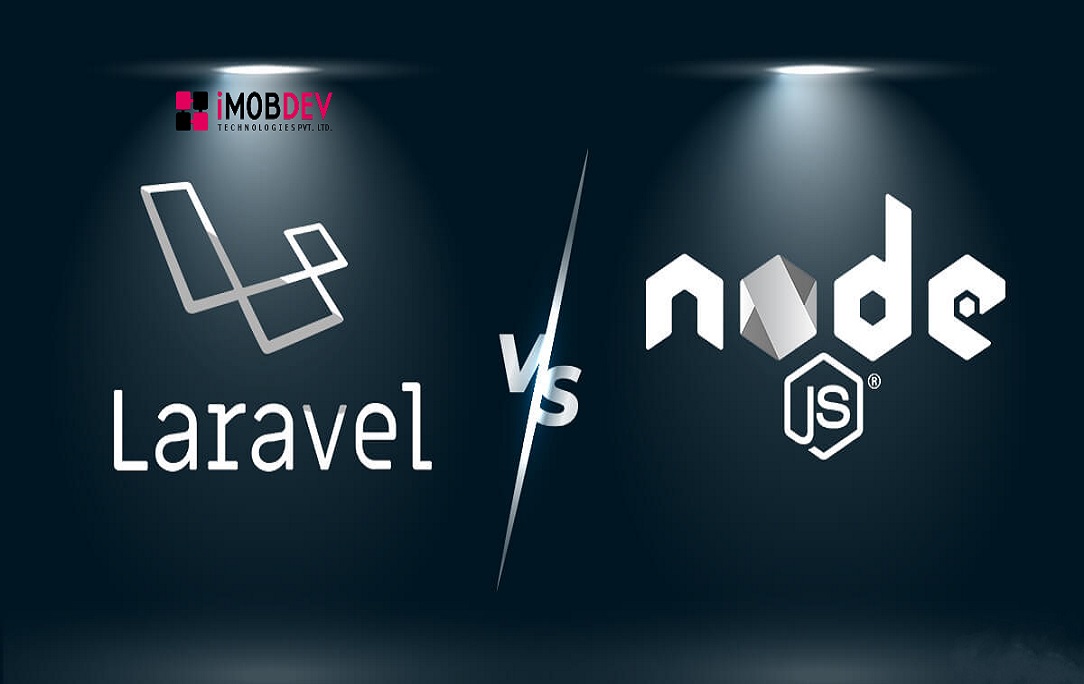Choosing the appropriate backend framework is a pivotal decision during the development phase as it significantly influences a web application’s scalability, performance, and overall success. Laravel and Node.js emerge as important challengers in this space, each with unique advantages and catering to different development methods.
Google, Facebook, and Amazon have all made important contributions to Node.js, increasing its popularity in the tech world. This post will go into the detailed principles of Node.js versus Laravel, presenting a detailed analysis of their significant distinctions. By looking at these characteristics, you can gain important knowledge that will help you choose the ideal framework for your project.
This comparison examines Laravel and Node.js’s features, applications, and disadvantages. Developers can make informed judgments that correspond with their development philosophies and satisfy the specific requirements of their projects by investigating these areas.
What is Nodejs?
Node.js stands as a robust server-side computing program, leveraging JavaScript and operating as a formidable open-source tool. Renowned for its high performance and dynamic capabilities, Node.js functions as a single-threaded framework, excelling in web loading and asynchronous programming. Underpinning its functionality is the V8 engine, seamlessly translating JavaScript into machine code.
Node.js advocates the adoption of frameworks that prioritize scalability and efficiency, enhancing the capabilities of the backend. Among these frameworks are Express, Socket.io, and Meteor.js. Particularly recommended for developing Real-Time Applications (RTAs), Node.js empowers the creation of web applications that responsively acknowledge user input in real-time.
Use cases of Nodejs
The following are some noteworthy Node.js use cases, especially when utilizing the knowledge of a Node.js Development Company:
Real-time Applications:
Node.js excels in real-time applications such as chat applications, online gaming platforms, and collaborative tools. Its event-driven model enables handling multiple simultaneous connections with low latency, making it ideal for applications that require real-time updates.
Microservices Architecture:
Node.js is ideal for a microservices design, in which numerous small, independent services communicate with one another. Its lightweight and scalable nature enables developers to efficiently construct and deploy microservices.
Content Management Systems (CMS):
Content management systems are increasingly being built with Node.js. Its efficiency in handling concurrent requests and real-time updates is beneficial for dynamic content-driven websites.
Streaming Applications:
Node.js is excellent for building streaming applications, such as video streaming platforms or real-time analytics dashboards. Its event-driven architecture allows for seamless handling of streaming data.
IoT (Internet of Things):
Node.js is appropriate for creating server-side apps for IoT devices. Because of its lightweight design and ability to manage asynchronous processes, it is well suited for managing and processing data from linked devices.
Command Line Tools:
Node.js serves as a formidable framework for the crafting of command-line utilities and scripts, leveraging its expeditious initiation and capacity to execute JavaScript beyond the confines of a web browser. This makes it the quintessential choice for the construction of utility programs and the automation of routine tasks, as it seamlessly amalgamates swift startup capabilities with the versatility to execute JavaScript in non-browser environments.
Proxy Servers:
Node.js can be employed to develop proxy servers that handle requests and responses, allowing for customization and optimization of data flow between clients and servers.
What is Laravel?
Laravel, developed by Taylor Otwell, stands out as an open-source PHP framework with robust server-side routing and HTML documentation capabilities. It is crafted on Symfony, leveraging reusable PHP components.
A Laravel Development Company harnesses the framework’s main benefits, focusing on server-side operations. Through predefined architecture, the company customizes templates, logic, and web portals, facilitating the development of full-stack applications. Additionally, Laravel Development Companies excel in managing and maintaining SaaS projects, providing comprehensive solutions for clients seeking efficient and scalable web development.
Use Cases Of Laravel
Web Application Development:
Web applications of various sizes, from small-scale initiatives to expansive enterprise applications, are frequently developed using Laravel. Its expressive syntax and MVC architecture provide a structured and efficient development environment.
E-commerce Platforms:
Laravel is well-suited to the creation of e-commerce systems and online shopping websites. Eloquent ORM and Blade templating, for example, make it simple to design and maintain powerful e-commerce apps.
Content Management Systems (CMS):
Laravel is utilized in the development of content management systems for websites and blogs. Its MVC architecture and modular structure make it convenient for building scalable and content-driven platforms.
Enterprise Resource Planning (ERP) Systems:
Laravel is well-suited for building ERP systems that integrate various business processes and functions into a unified platform. Its modular architecture allows for the development of scalable and customizable solutions.
Customer Relationship Management (CRM) Systems:
Laravel is employed in creating CRM systems to manage customer interactions, streamline processes, and enhance customer relationships. Its features, including Eloquent ORM and form validation, contribute to the development of effective CRM solutions.
Social Networking Platforms:
Laravel is chosen for developing social networking platforms and community-driven websites. Its real-time capabilities, coupled with features like user authentication and authorization, make it suitable for building interactive and engaging social applications.
API Development:
Laravel is frequently used to build robust and scalable APIs (Application Programming Interfaces). Its built-in tools, such as Eloquent ORM and Laravel Passport, simplify API development and authentication.
Job Portals and Recruitment Platforms:
Laravel is employed in the development of job portals and recruitment platforms. Its ease of integration with databases, along with features like job listing and user management, makes it a suitable choice for such applications.
Educational Platforms:
Laravel is utilized for building e-learning platforms and educational websites. Its capabilities for content management, user authentication, and data security contribute to the development of effective online learning solutions.
Conclusion:
Considerations such as development speed, scalability, and team proficiency are necessary for an informed decision that fits the specific needs of your project. Hire PHP developers and using Laravel is the best option if you’re looking for a flexible and reliable solution for PHP-based apps.
On the other hand, working with a web development company that specializes in Node.js development might be the best choice if your project entails real-time apps and need a high degree of concurrent. This calculated move guarantees that the experience and attention of experts in Node.js development will be applied to your project.











